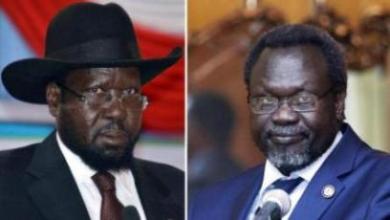SPLM-IO has right to question Kiir’s legitimacy – rebels
May 10, 2015 (ADDIS ABABA) – South Sudan’s ruling (SPLM) party’s opposition faction led by the country’s former vice-president, Riek Machar, said they have the right to question president Salva Kiir’s legitimacy when his elected term of office expires this month and described the government’s latest dismissal of their resolution as “not well thought of.”

“We have the right and power as citizens and organisation representing the voice of the people of South Sudan on the side of the constitution,” Machar’s spokesperson, James Gatdet Dak, told Sudan Tribune when contacted on Sunday.
“We have that constitutional power to question the legitimacy of president Salva Kiir whose elected term in office expires on May 21, 2015,” he said.
He also said they were not “rebels” as being called, saying they did not rebel against the constitution but were resisting “tyranny” in defence of the constitution, which he said was being violated by president Salva Kiir.
He said it was the president and his colleagues who were the “rebels” because they “rebelled against constitutionality” in the country in December 2013 and fabricated a military coup which resulted to the internal war.
Dak was reacting to remarks from president Kiir’s office which said the opposition group had no power to question whether the president was legitimate or not.
President Kiir’s press secretary, Ateny Wek Ateny, this week told reporters in Juba that the rebels had no power to question his president’s legitimacy, adding that the extensions by the national legislature of his term in office and that of the legislatures for three more years were done in order to avoid power vacuum when his term in office expires soon.
President Kiir was elected in April 2010 and took oath of office on 21 May 2010 before the country became independent from Sudan on 9 July 2011. His other 5 years of legitimacy granted by the transitional constitution, 2011, after independence, also expires on 8 July this year. The tenure for both houses of the national legislature already expired on 8 March 2015.
Elections were due to be conducted by June this year but this could not be possible because of the civil war which has engulfed the new nation.
But Ateny challenged the rebel group for not coming forward with an alternative solution to the imminent power vacuum, saying the opposition faction was simply criticizing the action by the government as unconstitutional.
However, Machar’s spokesman dismissed the criticism, saying the rebels had been providing a solution on many occasions which he said was also reaffirmed in the resolutions of the recent Pagak leadership conference on 23 April.
“Unless somebody either did not read or digest our resolutions well, or didn’t like them, resolution number 1 (g) has clearly provided for an alternative solution by reaffirming that in case of no general elections, the legitimate alternative for establishment and constitution of a recognizable national government is through a negotiated peace agreement and settlement,” Dak said.
He charged that instead of Juba leadership’s continuous drive to “buy weaponry and pay foreign mercenaries” to perpetuate the war at the expense of the people, while “unconstitutionally” extending their lifespan in office, the government should rather exert efforts in addressing the root causes of the conflict and reach a political settlement to end the war.
The issues, he said, were clear on the negotiating table in Addis Ababa, adding that these could be addressed and resolved in seven days if the government was equally serious so as to form a transitional government of national unity and hold elections after a period of transition.
In a lengthy explanation he criticised the government for lacking political will to end the war, further claiming this was reminiscent of the fact that it was the opposition group that always proposed reforms and solutions to the problems at the peace talks while the government was only “negatively” reacting to their proposals without justification.
The rebel leader’s spokesperson further argued that the movement was representing the people of South Sudan who had been yearning for better change and would therefore not allow the “visionless” leadership to get away with “tyranny” and further violations of the constitution.
“We are a resistant movement in defense of the constitution against tyranny in our country. We also represent the majority of the voices of our people,” he further claimed, adding that they were also a force to be reckoned with as they continued to control strategic territories, including at some regional borders and oilfields in the country.
The opposition leader’s media official further reiterated that the rebel group was committed to the peace process to reach a “meaningful” peace agreement with the government, adding their negotiating team was ready to resume with the peace talks in Addis Ababa.
The East African regional bloc (IGAD) which has been leading the peace process for the past 16 months is yet to announce a date for the resumption of the peace talks as it attempts to expand membership of the mediation mechanism beyond the continent.
(ST)
